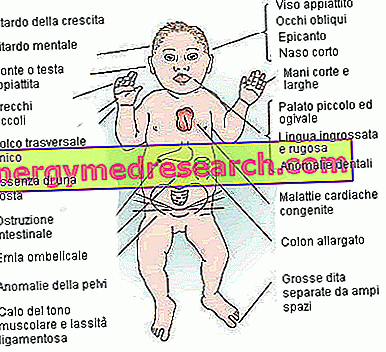Definition
The term "labyrinthitis" refers to an inflammatory process affecting the labyrinth of the ear and some of its internal structures. The labyrinthitis must be treated from the very first symptoms, since the disease, degenerating, could cause the total and irreversible loss of hearing.
The labyrinth is placed in an inner portion of the ear and its function is to guarantee balance and hearing; when the integrity of this complex structure is lacking, the regulation system fails.
Causes
Although the triggering factor of labyrinthitis is not known, it is assumed that a bacterial or viral insult is the most accredited cause; however, it has been observed that some conditions can predispose to the disorder: head injuries, allergic reaction to a drug (eg antibiotics), extreme stress.
Symptoms
A common element in all forms of labyrinthitis is the constant or irregular sensation of loss of balance and dizziness: these symptoms can be accompanied by tinnitus, confusion, difficulty maintaining balance, dizziness, stomach pain, nausea, nystagmus, pallor and hearing loss. Mood alteration, anxiety and depression, secondary effects of labyrinthitis, can cause panic attacks, palpitations and even quite severe tremors.
The information on Labirintite - Labirintite Drugs for the Treatment of Labyrinthitis is not intended to replace the direct relationship between health professional and patient. Always consult your physician and / or specialist before taking Labirintite - Labirintitis Medication.
drugs
Given the delicacy of the vestibular system, the target of the disease, and the rather debilitating complications of labyrinthitis, it is understandable that immediate medical consultation is essential. After having subjected the patient to a series of diagnostic tests, aimed at both detecting the disease and detecting the causal element, the patient with labyrinthitis can be treated with specific drugs to break down the responsible pathogen (beat or virus), to counteract vertigo (a symptom common to all forms of labyrinthitis) and to remove secondary effects such as anxiety, depression, palpitations, etc.
In some cases, labyrinthitis occurs so abruptly and violently that pharmacological treatment alone is not sufficient to reverse the disease: in this case, surgery is the last, extreme, possible therapeutic option.
In addition to the treatments mentioned above, the patient can follow a vestibular therapy, characterized by specific exercises aimed at improving balance and removing vertigo; moreover, it is a good rule to instruct the patients with labyrinthitis to follow some simple tips, in order to speed up the recovery:
- Avoid sudden movements, from the first symptoms of vertigo
- During the labyrinthine attacks, stand still in the same position, without shaking or turning the head
- Avoid reading, even after a few hours of labyrinthine attack
- Prefer poorly lit rooms, especially during and after the vertigo attack
- Do not drive or perform dangerous activities, especially at times that follow the labyrinthine crisis and in those at risk
Antiviral and antibacterial drugs : indicated to remove the virus or the bacteria responsible for the infection in the context of viral labyrinthitis:
- Acyclovir (eg Aciclovir, Xerese, Zovirax): the drug is an inhibitor of the DNA synthesis of the herpes viruses. In some patients, in fact, the labyrinthitis derives from an infection supported by the Herpes simplex virus or Herpes zoster (varicella); administer the drug orally (800 mg) four times a day for 5 days, or intravenously (10 mg / kg body weight) every 8 hours, for a period varying from 7 to 10 days (or in any case until the lesions of the chicken pox disappear). For children weighing less than 40 kilos, administer 20 mg / kg of drug 4 times a day for 5 days; if the child weighs more than 40 kilos, the adult dose is recommended.
- Valaciclovir (eg. Talavir, Zelitrex, 500 mg or 1000 mg): administer the drug in patients aged between 2 and 18 years at a dose of 20mg / kg, three times a day for 5 days; however, the total daily dose should not exceed one gram. The therapy must coincide with the onset of symptoms. Consult your doctor.
- Amoxicillin (eg. Augmentin, Klavux): the drug is indicated for treating infections caused by bacteria, in particular bronchitis, ear infections, chlamydial infections and pyogenic streptococcus infections, also in the context of labyrinthitis. Indicatively the therapy lasts 7-10 days: the dosage foresees to take 250-500 mg of active by mouth, every 8 hours, for 7-10 days, or 500-875 mg orally twice a day.
Drugs for dizziness control : The administration of anticholinergic drugs can counteract the effects exerted by acetylcholine, a very important neurotransmitter (useful for the transfer of nerve impulses in the various sites of the central and peripheral nervous system), the excess of which can cause nausea and vomiting .
As we have seen, the vertigo that accompanies the labyrinthitis can cause anxiety and vomiting: in this regard, the patient can take specific drugs that, although they do not act in any way on the triggering cause, can improve general health by removing secondary symptoms.
Although vertigo is characteristic of labyrinthitis, it does not mean that an attack of vertigo is synonymous with labyrinthitis.
- Proclorperazine (eg Stemetil): belongs to the class of phenothiazines (cholinergic antagonists). Prescription drug for vertigo treatment in the context of labyrinthitis. Generally, it is recommended to take 5-10 mg of drug (tablets), 3-4 times a day; alternatively, take 10-15 mg of active in the form of capsules every 12 hours. By rectal route, the drug is taken at a dose of 25 mg, twice a day; intramuscularly, 5-10 mg as needed. Finally, the drug is also available as a solution for injection into a vein: 2.5-10 mg per slow IV injection (no more than 5 mg per minute). Do not exceed 10 mg in a single dose.
- Metoclopramide (eg Plasil): a drug belonging to the class of dopamine blockers. Parenterally, take 10 mg of drug, three times a day, preferably before meals. Also available in tablets and syrup. It can be used in pregnancy to reduce nausea and possibly vomiting, even if it is not the first choice drug for pregnant women.
- Meclizine (eg. Antivert): the recommended dose for the treatment of vomiting in the context of labyrinthitis is 25-50 mg of drug, to be taken orally once a day, as needed.
- Dimenhydrate (eg. Travelgum, Xamamina, Lomarin, Valontan): indicated for treating vomiting and nausea while traveling by car, plane, ship, even (but not only) in the context of labyrinthitis. Available in the form of chewable 20 mg confetti, the drug should be taken every 3-4 hours, as needed.
For further information: read the article on drugs for the treatment of nausea and for the treatment of vomiting
Corticosteroids : when the labyrinthitis is the result of a viral or bacterial insult, the inflammation of the labyrinth can be treated with cortisone, useful also to prevent complications; it is recommended to start therapy as soon as possible, to avoid complications, which can often degenerate into permanent deafness. Prednisone is the most widely used steroid drug to appease inflammation associated with viral labyrinthitis.
- Prednisone (eg. Solprene, Deltamidrina): the dosage must always be established by the doctor on the basis of the severity of the disease and on the patient's condition. Indicatively, the dose to be taken varies from 5 to 60 mg a day, possibly divided into several doses (1-4) during the 24-hour period.
Anxiolytic and antidepressant drugs : the patient suffering from labyrinthitis often complains of anxiety and mood alteration; the administration of these active ingredients can improve its general conditions. It is recommended not to use these drugs for long periods, to not suddenly stop the therapy and to always respect the doses prescribed by the doctor.
- Diazepam (eg. Micropam, Ansiolin, Diazepam FN, Valium, Diazepam, Valpinax): the drug belongs to the benzodiazepines and, until a few years ago, was used very much in therapy. Given the striking side effects, benzodiazepines have been replaced by other antidepressant drugs, including for treating labyrinthitis symptoms. Patients suffering from labyrinthitis associated with anxiety can take a variable dose of 2 to 10 mg, to be taken 2-4 times a day, depending on the severity of the condition. It is also possible to take the drug intramuscularly or intravenously: 2-5 mg are indicated for the treatment of mild or moderate anxiety, while in case of severity it is recommended to administer 5-10 mg of active. If necessary, repeat the administration every 3-4 hours.
- Fluoxetine (eg. Prozac, Azur, Flotina, Fluoxeren): based on the severity of depression in the labyrinthitis, it is recommended to take the drug at a dose of 20-40 mg per day. Generally, during the first week of treatment, the drug causes nausea, a condition that still tends to disappear in a short time; for this reason it is not often used in therapy for the control of anxiety associated with labyrinthitis. Continue therapy for at least 3 weeks, unless otherwise advised by your doctor.
- Sertraline (eg Zoloft, Sertraline, Tralisen): it is recommended to start therapy with an active dose of 50 mg / day. If necessary, increase the dose by 50 mg every 2-3 weeks. Do not exceed 200 mg a day. The maintenance dose is 50 mg a day.
- Paroxetine (eg Sereupin, Serestill, Eutimil, Daparox): the drug is a selective serotonin reuptake inhibitor, particularly indicated for treating generalized anxiety, also in the form associated with labyrinthitis. Indicatively, it is recommended to start therapy with a dose of 20 mg / day, which can be increased up to 50 mg per day (it is possible to increase the dose by 10 mg every 2-3 days, depending on the response) . Consult your doctor.
For further information: read the article on drugs for treating anxiety and treating depression
It is important to remember that the administration of anxiolytic drugs and mood modulators is not useful for the cure of the disease, because it does not act on the triggering cause; however, the administration of these drugs improves the patient's quality of life and helps to better overcome the labyrinthitis.



